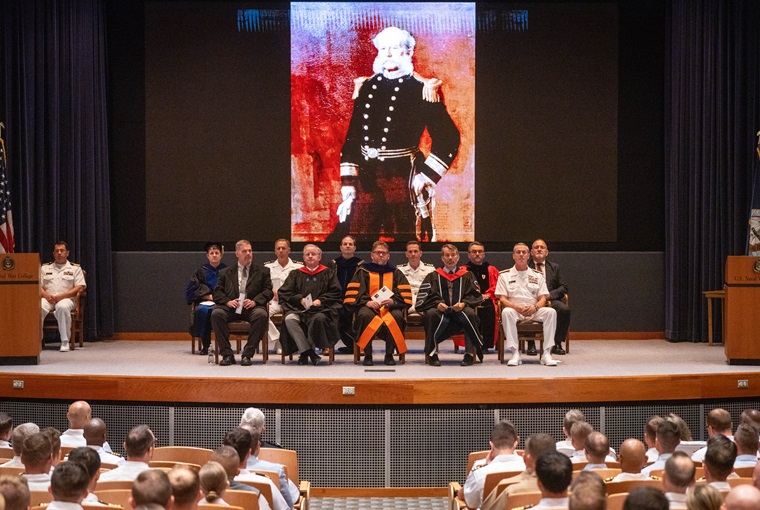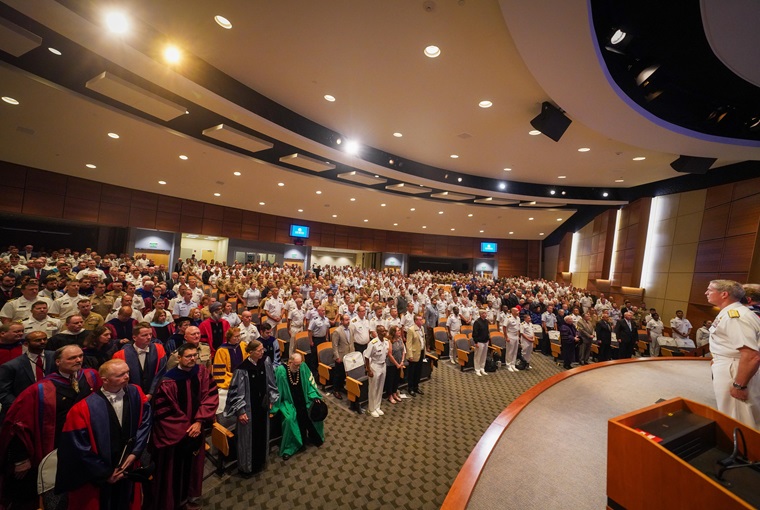New Course Fuses Theory and Practice in Study of Modern Warfare

NEWPORT, R.I. - The U.S. Naval War College (NWC) began its 2024-2025 academic year with the introduction of a new course, Perspectives on Modern War (PMW), combining the theoretical analysis of war with development of practical solutions for current and future global security challenges, Aug. 6.
PMW was announced as part of NWC’s convocation ceremony welcoming more than 462 students from all six branches of the U.S. armed services, civilian employees of the U.S. federal government, and international military officers from 46 partner and Allied nations.
In his welcome address to students, Rear Adm. Pete Garvin, president of NWC, attributed the need for expanded professional military education curriculum to the rapidly changing, complex global geo-political environment and the strategic mindset needed to face future warfighting challenges.

“Courses like PMW will continually bring in current events and emerging technologies along with guest speakers and thought leaders into a new year-long learning community construct,” Garvin told newly arrived students. “Much like the advent of airpower and radar changed the conduct of warfare, we now must consider new domains and the transformational effect of advances in technology.”
Designed to more rigorously challenge students and serve the Navy, Joint Force and interagency, the course synthesizes learning objectives across all three trimesters at NWC and requires students to critically analyze the changing character of modern warfare, honing their abilities in critical thinking, assessments, strategic analysis, ethical decision making and leadership.
“This course is part of the overarching push to make NWC’s educational processes and programs more agile and responsive to the needs of the joint warfighter regarding the conduct of war in the contemporary and near-future strategic environment,” said Daniel R. Post, Ph.D., NWC professor and PMW co-director.
PMW will use a seminar-based approach, combining content from senior guest lectures, core curriculum seminars, reading assignments, and wargaming results to meet course objectives and task students with answering the most critical warfighting questions of the day.
Content from academic conferences, such as the college’s Current Strategy Forum (CSF) and Future Warfighting Symposium (FWS), will also be integrated, providing students the opportunity to evaluate how the diverse experiences and expertise of military, government, academic and industry leaders can be used in critical analysis of their own past and potential future leadership challenges.
“Skilled leadership is the cornerstone of one’s ability to coordinate the elements of national power in the development and implementation of effective warfighting strategies,” said Cmdr. Brian Young, professor at NWC and PMW director. “This course provides an agile platform through which students can leverage course components to effect critical analysis of the most important challenges to leadership in modern war.”
The course includes three dedicated seminar days and two symposium days per trimester and requires four written assignments to complete. Upon successful completion of PMW, students will receive two credit hours toward their master's degree requirements.
PMW is now one of five core course offerings provided by NWC’s College of Naval Command and Staff, College of Naval Warfare, Naval Command College and Naval Staff College. NWC’s curriculum provides a framework for military and civilian leaders to gain an understanding of strategy and operations and the ability to think critically, deal with uncertainty and surprise, be proficient in joint matters, and comprehend both the security environment and all elements of national power.
Established in 1884, NWC is the oldest institution of its kind in the world. The college delivers excellence in education, research, and outreach, informing today’s decision makers, educating tomorrow’s leaders, and engaging partners and allies on all matters of naval power in order to preserve the peace, respond in crisis, and win decisively in war.
